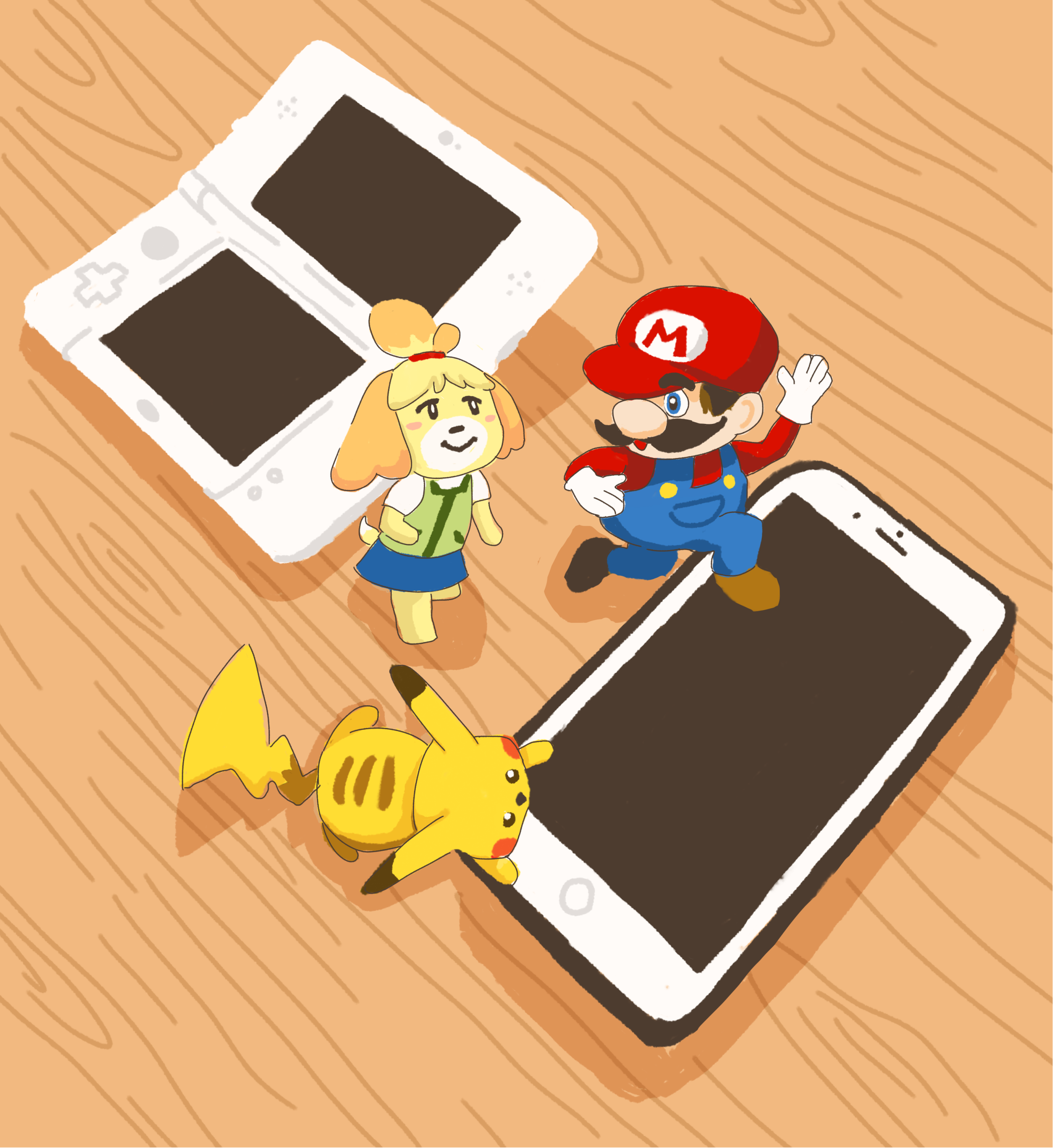Gamer’s Guidebook: Mobile adaptations of Nintendo games fall short of their original glory

(Claire Sun/Daily Bruin)
By Evan Charfauros
Jan. 23, 2018 10:29 p.m.
Games have always been a huge part of the entertainment industry, but what makes them entertaining? Game-makers expend significant effort making design decisions that people often don’t think about when they’re playing each game. Each week, columnist Evan Charfauros will examine the pros and cons of different game mechanics as seen in the modern gaming industry.
Most people probably remember that surreal two weeks or so in 2016 when everyone and their mother ventured into local coffee shops and churches to catch Pikachu.
“Pokemon Go” was a global sensation immediately upon release, breaking several Guinness World Records for mobile apps and Nintendo’s stock shares skyrocketed. The app, a collaboration with augmented reality developer Niantic, was the first in a line of Nintendo mobile endeavors. Though historically opposed to producing games for mobile devices, the company announced its new mobile platform initiative in 2015, perhaps as a response to the dismal sales of the company’s then-latest console, the Wii U.
Less than two years later, Nintendo’s console influence did a complete 180 with the release of the Nintendo Switch – reportedly the fastest-selling gaming console of all time in the United States. But the newfound support from their console release hasn’t deterred Nintendo from continuing its foray into the mobile genre. With the release of “Animal Crossing: Pocket Camp” in November, Nintendo has now produced mobile installments for five of its major game series.
While the company has done an admirable job of adapting the signature mechanics of each series to the mobile platform, none of its app releases so far have successfully reached the legendary standards set by Nintendo’s handheld and console games. Nintendo has the power and influence to transform mobile games into a platform for serious and fulfilling gameplay, but so far its apps have lacked depth.
Niantic’s work on “Pokemon Go” made for an initially trendy game with a great concept: catching Pokemon in the real world through augmented reality. But the game’s lack of several “Pokemon” staples, notably the ability to battle wild Pokemon and other players, made the mobile app stale quickly.
Similarly, the recent “Pocket Camp” pales in comparison to its “Animal Crossing” predecessors with its linear gameplay progression, limited map and forgettable character interactions. “Pocket Camp” eventually feels like an endless cycle of pointless gathering and furniture-building for characters with cookie-cutter personalities.
2016’s “Super Mario Run” showed more promise with its design decisions. The app embraces the exceedingly simple interface of mobile games – Mario constantly runs forward in this game, reducing the controls of a classic Mario game to single taps on the screen to make the character jump. The restricted movement options lead to interesting level designs built around the side-scrolling mechanic.
Certain terrains transform Mario’s regular jump into a backflip or a forward leap, leading to strategic timing puzzles for players who want to reach collectible coins in each level. It’s a game that feels like it’s made for mobile – but it’s still fun. Unfortunately, even after paying $10 for the full game, “Super Mario Run” only takes a few hours of play to complete.
Mobile gaming as a whole operates differently from more traditional gaming mediums in terms of consumer expectations. Accessible by anyone with a smartphone, the Android and iOS app stores supply a much wider and more casual user base than console and handheld games do, causing the free-to-play business model to spread throughout the mobile market.
Free-to-play games make their income through in-game ads or through dreaded microtransactions, which entail optional upgrades behind cheap paywalls. I say cheap, but a few $3 gem purchases can quickly multiply until it gets out of hand.
Too often, microtransactions throw off a game’s balance. If the advantages are too great, games either become too easy and therefore less fun for paying players or leave nonpaying players unable to keep up with in-game demands that their paying counterparts can bypass. If the advantages are too slim, it leaves paying players feeling cheated by their insignificant purchases.
“Pokemon Go,” “Super Mario Run” and “Animal Crossing: Pocket Camp” all feature varying numbers of annoying microtransactions, but Nintendo’s biggest offender so far is “Fire Emblem Heroes.” The app actually includes a well designed version of the main series’ battlefield grid and turn-based combat optimized for fingers on a small screen, but the playable characters are recruited through a randomized summoning mechanic that uses in-game currency called orbs.
Because the stats of summoned characters vary widely, a player has to pay money for more and more orbs if they want to continue to try their luck for better characters. The careful strategy of “Fire Emblem” feels lost in this iteration’s roulette-like recruitment.
Admittedly, the mobile genre allows for some advantages. The ability to frequently update mobile apps benefits the Nintendo games greatly. “Pokemon Go” has seen several improvements since its publication, including the introduction of partner Pokemon, new Pokemon species and a better combat system. “Super Mario Run” received a new game mode in September introducing short “remixes” of previous levels played in quick succession, allowing for much-needed replayability.
But a few improvements have not been enough to make the mobile entries feel like real Nintendo games. The company that introduced the touch screen to gaming, that first integrated real-life motion into control systems and that most recently combined handheld and console gaming into a single entity can and should have more to contribute to the mobile platform.


